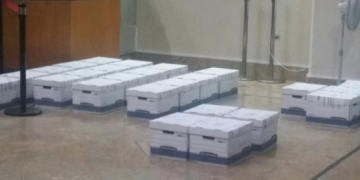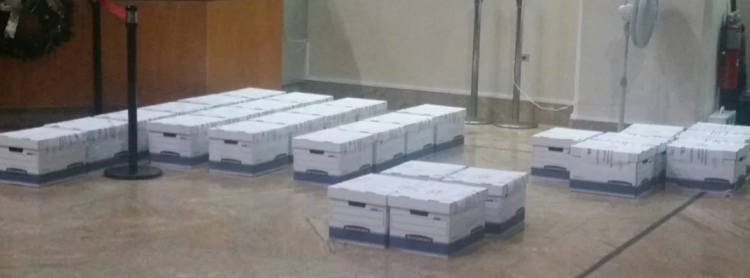(TRINIDAD NEWSDAY) — Minutes before the deadline for changing old $100 bills, a 65-year-old pastor from Chaguanas tried to change $29 million in cash.
Newsday was told the man, who has a church in Longdenville, showed up shortly before the bank closed, with 29 copy-paper boxes, each containing $1 million.
He said the money was his personal funds.
The pastor was accompanied by his son, daughter-in-law and two attorneys. Members of the Financial Intelligence Branch (FIB) said the man had promised to come in with the cash days before and repeatedly visited the Central Bank promising to do so.
The cash was seized by FIB officers, who are working with the Financial Intelligence Unit (FIU) on investigating it. Sgt Seecharan of the FIB is heading the investigation.
The man was not arrested, but police will seek to have him explain his source of income. Financial offences he may have committed include money laundering.
On December 5 last year, National Security Minister Stuart Young said the polymer $100 bill, which has now replaced the paper notes, would help fight money laundering and other illicit activities.
The public was mandated to change the old notes for the polymer ones by December 31. The short – two-week – timeframe for changing the old notes was to weed out money laundering and other financial crimes, the Government said.
During the early stages of the process, Young said one man, who claimed to be a barber, showed up at a bank with $1 million in old notes to exchange.
He added that since the new notes were made available, a number of unusual transactions had been flagged. He stressed that law-enforcement officers who were part of the process and were stationed on the basis of security intelligence.
Months before the announcement of the new notes, the FIU flagged 429 suspicious transactions, amounting to $749,024,557.
The cash seized on Tuesday is the largest amount ever seized by police, sources in the FIB said.
In an e-mailed response to Newsday questions on December 14, acting head of the FIU Nigel Stoddard said there was an increase in reported money-laundering activities in the third quarter last year, compared to the same period in 2018. In 2018, there were 237 reports, and 247 in 2017. The second highest figure was 300 reports in the last quarter of 2018. The figure was 179 in 2017.


















